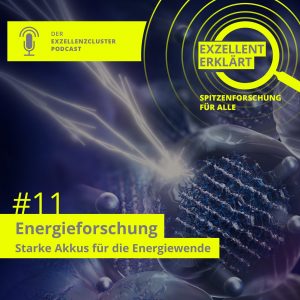 In 2030, more than ten million electric cars will populate the roads in Germany. And all of them will need a powerful, fast-charging and safe battery. How is this supposed to work?
In 2030, more than ten million electric cars will populate the roads in Germany. And all of them will need a powerful, fast-charging and safe battery. How is this supposed to work?
In this episode of the podcast “Exzellent Erklärt“, Prof. Dr. Bettina Lotsch and Sina Stegmaier from e-conversion provide insight into battery research. What are the problems of current rechargeable batteries? And how could they be solved? The two chemists also explain how batteries actually work and what materials are needed for a high-performance battery. And they reveal what solid-state batteries are all about, in which the automotive industry in particular has such high hopes.
The experts
Bettina Lotsch is Professor of Nanochemistry at LMU Munich and Director at the Max Planck Institute for Solid State Research in Stuttgart. She and her team develop and research new materials for the conversion and storage of energy. This includes molecular networks for the conversion of sunlight into chemical fuels and the development of novel light storage concepts such as solar batteries. In addition, she is working on a new type of batteries that do not require liquid electrolytes – the so-called solid-state batteries.
Sina Stegmaier is a PhD student at the Chair of Theoretical Chemistry at the Technical University of Munich (Prof. Karsten Reuter). Using computer-based simulations, she is trying to find out how battery materials behave at the atomic level. The understanding is essential for targeted optimization of these materials in the laboratory.
The podcast
57 Clusters of Excellence, 1 podcast. “Exzellent Erklärt – Spitzenforschung für alle” reports regularly from one of the research networks that are funded within the framework of the Excellence Strategy of the German federal and state governments. The journey goes right across the country, and the topics are just as diverse as the locations: From A for “Afrika Studien” to Z for “Zukunft der Medizin”.
Listen in!
Listen to the podcast here, via the website (www.exzellent-erklaert.de) or subscribe to “Exzellent Erklärt” at the podcast provider of your choice.
